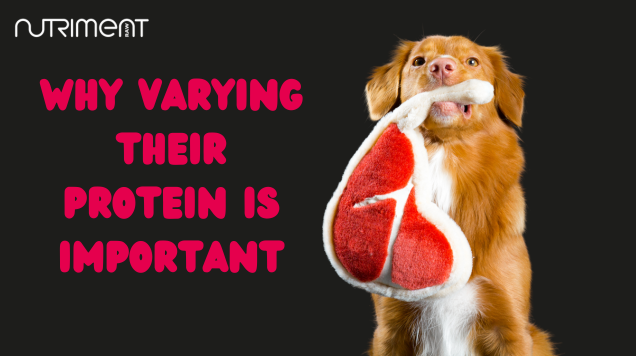The importance of feeding a variety of proteins

Why should I vary my dog’s protein source?
When you buy a 15kg bag of kibble, chances are your dog is going to be eating the same type of protein (e.g. chicken, beef, lamb etc.) meal after meal, day after day for as long as 6-8 weeks. Yes, it certainly seems convenient for the human, and most pups will give a bowl of biscuits a taste, but is it really in their best interests?
Whilst there are many reasons why kibble isn’t the most nutritious choice of food for a happy and healthy pup, we want to talk about one thing specifically in this post – and that is the risks associated with single protein-source diets.
Protein allergies
While grain allergies are the most common seen in dogs, they can and do develop allergies to specific proteins in their diets.
Dogs are not born with protein allergies; these develop as a result of constant exposure to the same protein. Repeated exposure to a single protein, such as chicken, can lead to the body becoming less and less able to break down the protein and cause the body’s immune system to start treating the protein as harmful. This is what causes an allergic reaction.
Signs that your dog has become allergic to their single-source protein can include itchy, sore skin, a rash, saliva staining, vomiting, diarrhoea, sore tummy, and excessive wind. These are all very unpleasant for both dog and owner and left untreated can develop into more serious gastrointestinal ailments. If you notice one or more of these symptoms developing, consult your vet and consider changing your dog’s diet.
Protein variation
A simple way to tackle the risk of your dog developing a protein allergy is to vary your dog’s protein source regularly. Feeding a raw diet is a very simple way to achieve this, due to the variation of high-quality proteins and convenient mix-and-match buying style.
Nutriment understands the risks of protein allergies in dogs, and therefore formulated recipes and raw food products that incorporate a variety of proteins including beef, chicken, offal, tripe, salmon, turkey, duck, lamb and venison. These recipes can be interchangeably fed to keep your dog’s diet interesting, tasty and allergy-proof.
We recommend you feed a minimum of 3 different proteins each week. Check out our 10kg mixer box, which contains 6 different protein sources!
Novel proteins
‘Novel’ proteins are protein sources that your dog may have rarely or even never eaten. This means that their immune system has not developed an overreactive response to the protein and therefore it should be ‘safe’ for your dog to eat.
Examples of accessible novel proteins for dogs include rabbit, duck, turkey and venison (of course this is completely dependent on each individual dog and their past eating habits and experiences).
There are many Nutriment recipes and formulations that include novel proteins, ideal for dogs that are experiencing strong allergic reactions to more conventional protein sources.
Nutritional variation
Aside from the risk of developing allergies, there is another very important reason why incorporating a variety of protein sources in a dog’s diet is a good idea, and that is nutritional variation.
Different meats offer different types of nutrients, amino acids and health benefits, which your dog will be deprived of if they are only fed one type of food throughout their life. We’ve summarised the nutritional attributes (aside from high-quality protein) of the different types of meats available from Nutriment below:
- Beef – Iron, zinc and B-vitamins
- Chicken – Vitamins B3, B6 and B12, magnesium, potassium and zinc
- Lamb – Omega-3, vitamins B3 and B12, zinc and selenium
- Duck – Vitamins B3 and B6, zinc, selenium, omega-3
- Offal – Vitamins A, B2, B6, B12 and C, riboflavin, zinc, selenium, copper, iron, folate, niacin, omega-3 fatty acids, enzymes
- Tripe – Enzymes, gastric juices, amino acids and Lactic Acid Bacteria
- Turkey – Vitamins B3 and B6, selenium and phosphorous
- Salmon – Omega-3
As always, our in-house canine nutritional advisors are on hand to discuss any aspect of your dog’s diet with you – including the risks of protein allergy development and how to keep a varied protein diet for your dog. Get in touch with us to speak to a nutritional advisor today!






